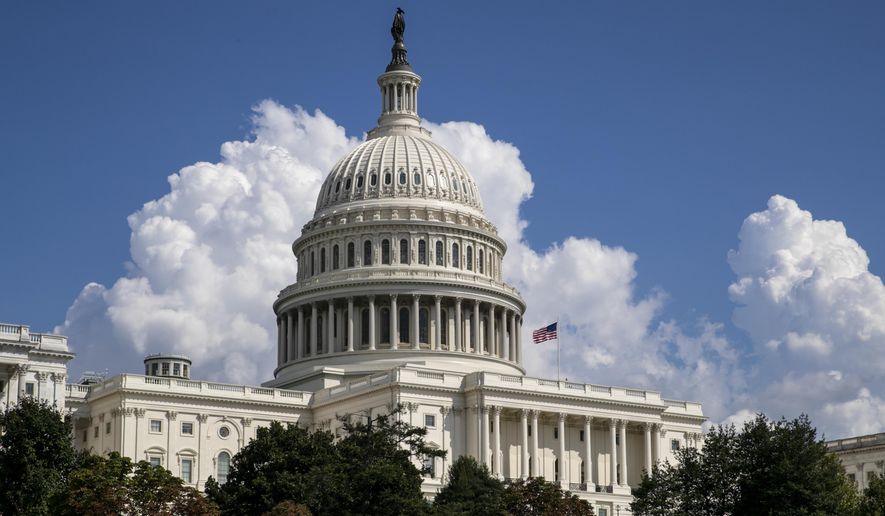President Biden and House Speaker Kevin McCarthy’s deal to hike the debt limit until after the 2024 elections has Republicans and Democrats up in arms.
Conservative members of the House Freedom Caucus say the agreement doesn’t slash spending enough. Liberal Democrats, meanwhile, say the proposed welfare work requirements are too drastic.
“It doesn’t get everything that everybody wanted, but that’s how it’s like in a divided government,” said Mr. McCarthy, California Republican. “That’s where we end up. I think it’s a very positive bill.”
The agreement would raise the $31.4 trillion debt limit until after the 2024 presidential election, claw back billions of dollars in unspent pandemic relief and cut IRS funding.
Domestic spending would be flat for the upcoming fiscal year. Defense spending is set to grow by more than $26 billion. After this year, the growth of federal spending would be capped at 1% through 2025.
House Republicans say the growth of federal spending is actually capped for six years, but the deal’s spending targets are not enforceable after 2025.
“There’s nothing you can do that binds the next Congress,” said Rep. Garret Graves, Louisiana Republican.
Mr. McCarthy and Mr. Biden have further agreed to streamline the federal permitting process for new energy projects. The deal includes a pay-as-you-go provision requiring Mr. Biden to offset any rules or regulations that increase federal spending.
The agreement would expand work requirements for recipients of food stamps and direct cash payments. Able-bodied, childless recipients of each program 54 and younger would be required to work at least 20 hours per week to keep their benefits. The work requirements would expire in 2030.
Rep. Pramila Jayapal, a Washington Democrat who chairs the Congressional Progressive Caucus, described the work requirements as “terrible policy.”
“Work requirements are bad policy. They don’t reduce spending, they create administrative burdens, and they simply don’t work,” Ms. Jayapal said. “The fact that this is a GOP priority is cruel, and every American should know what they’re trying to do to poor and working families.”
Under the deal, childless food stamp recipients would be subject to new restrictions for how long they can collect the benefits. The deal does expand access to food stamps for veterans and the homeless.
SEE ALSO: A ‘win for the entire country,’ Republicans tout energy-permit rules in debt limit deal
It represents a compromise for Mr. McCarthy and Mr. Biden. House Republicans initially sought a $130 billion cut to non-defense spending this year and a decade’s worth of spending caps.
Mr. McCarthy had sought to cancel Mr. Biden’s student loan forgiveness program and rescind more than $200 billion in green energy tax credits that Democrats passed last year. Both demands were sidelined amid opposition from the White House.
“The agreement protects my and congressional Democrats’ key priorities and legislative accomplishments,” Mr. Biden said.
Members of the House Freedom Caucus say that is the exact problem.
“Our base didn’t volunteer, door knock and fight so hard to get us the majority for this kind of compromise deal with Joe Biden,” said Rep. Lauren Boebert, Colorado Republican. “Our voters deserve better than this. We work for them. You can count me as a no on this deal.”
Mr. McCarthy pushed back on the criticism during an appearance on “Fox News Sunday.”
“Right now, the Democrats are very upset,” he said. “There’s nothing in the bill for them. There’s not one thing in the bill for Democrats.”
Mr. McCarthy said “more than 95%” of the House Republican Conference is excited about the deal. Conservative hard-liners disputed that claim.
“RINOs congratulating McCarthy for getting almost zippo in exchange for [a] $4 trillion debt ceiling hike was enough to make you [sick],” said Rep. Dan Bishop, North Carolina Republican.
Rep. Chip Roy of Texas, a member of the Freedom Caucus, said Republican opposition would swell as lawmakers examine the deal. Mr. McCarthy has pledged that the legislation will be public for 72 hours before a vote is cast in the House.
“They haven’t been educated yet on what a turd sandwich this deal is,” Mr. Roy said. “They will be.”
Opposition from the Freedom Caucus could prove insurmountable. Given the narrow majority in the House, Mr. McCarthy can lose only four Republican votes before having to rely on Democratic support.
Mr. McCarthy said he is confident that the majority of House Republicans will support the deal. He also predicted that most House Democrats will follow Mr. Biden’s calls to support the agreement.
Rep. James Himes, a moderate Democrat from Connecticut, is not sold on the package. He said on “Fox News Sunday” that the whole agreement resulted from “a corrupt enterprise.”
“I have not made up my mind,” Mr. Himes said. “Not a bill that will make any Democrats happy, but it is a small enough bill that in the service of actually not destroying the economy this week may get Democratic votes.”
A failure of the deal in the House would endanger Mr. McCarthy’s leadership.
The Freedom Caucus nearly tanked Mr. McCarthy’s speakership bid this year. In exchange for allowing Mr. McCarthy’s ascension, conservatives pushed through a rules package that decentralized the power of congressional leadership.
The crux of the overhaul rests on a provision letting any lawmaker force a vote on retaining the speaker. Conservative opposition to the debt limit deal has raised questions about whether Mr. McCarthy will be ousted over it.
Mr. McCarthy said he isn’t worried about the prospect.
• Haris Alic can be reached at halic@washingtontimes.com.
• Ramsey Touchberry can be reached at rtouchberry@washingtontimes.com.




Please read our comment policy before commenting.